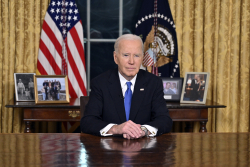The United States cannot defeat the Houthis militarily, and its attempts to do so are further weakening the U.S. military in the places that truly matter.
While meeting with his Canadian counterpart, newly elected Prime Minister Mark Carney, on Tuesday, President Donald Trump made a welcome announcement. The president claimed that he had just received word from the Houthi rebels in Yemen that they would discontinue their attacks on U.S.-flagged ships passing within range of their increasingly lethal missiles. This is a much-needed development for the United States and international shipping.
The deal was brokered by Oman and coordinated with Steve Witkoff, Trump’s Middle East envoy and unofficial negotiations czar. And it is cause for celebration, seeing as the Houthis had been holding their own against the might of the United States Navy for years. A reprieve was needed.
Sadly, however, that is all this is—a reprieve. It is certainly not victory—or at least not a real military victory as most Americans envision. Indeed, the Houthis announced shortly after Trump’s comments that they would continue to target vessels linked to Israel—the reason that the United States initiated its anti-Houthi operations in the first place. Instead, the ceasefire was borne out of the fact that the U.S. Navy simply could not defeat the Houthis, regardless of however many targets it blasted from the air in Yemen.
Just as with Afghanistan, the Americans have been unable to defeat what is basically a Zaydi Shiite liberation front in Yemen. As America saw with the Taliban of Afghanistan—which was itself a Pashtun liberation movement—defeating such indigenous forces with deep connections to the land, people, and culture is nearly impossible for foreign armies, and particularly for expeditionary forces of the kind the Americans embody.
About Trump’s Yemen Ceasefire Deal
The deal comes from the Houthis, and it sounds as though they are the ones driving the outreach. It’s a simple exchange: in exchange for the Houthis discontinuing their attacks on the Americans, the Americans must stop attacking the Houthis. This is not an American military victory in any sense. It is instead a Houthi offer—on behalf of Iran—to pause hostilities, and in so doing to undermine the strained U.S.-Israeli relationship.
And with America out of the picture, the Houthis will certainly seek to concentrate all their firepower on Israel in the weeks ahead, as Jerusalem prepares to invade and occupy the Gaza Strip. In the last week, the Houthis lashed out against Israel by launching what was likely a Palestine-2 hypersonic missile that landed “near” the Ben-Gurion International Airport.
In response to that attack, Prime Minister Benjamin Netanyahu retaliated against Yemeni transportation infrastructure, launching attacks against the international airport in Sana’a, the capital of Yemen, and against the critical Port of Hodeidah. For their part, the Houthis have claimed they are “studying” the Israeli strikes, as well as the lack of Israeli air defenses around Ben-Gurion International Airport, with clear intention to continue their campaign against Israel. Indeed, the Houthis continue to threaten Israel with what they’re calling an “air blockade”—essentially a threat to shut down Israeli airspace.
Why the Houthis Agreed to the Deal
More than that, however, the Houthis are insisting that they will continue targeting Israeli ships and assets, despite the massive bombardment the Israeli military subjected the Houthis to today. Clearly, the Houthis do not want to have to fight both the Americans and Israelis. Sure, they’re holding their own against the U.S. Navy already. But even so, it is never wise to fight a two-front conflict. And placating the Trump administration makes this a much more regional fight, between players who live in the region who are affected far more by these events than are the Americans.
We have no idea if the ceasefire will hold between the Houthis and Americans. But it might, considering that the Trump administration clearly wants out of the quagmire that it has found itself in with the Houthis. Further, if America’s war continued against the Houthis, given the likely presence of hypersonic weapons in the hands of the Houthis, it was only a matter of time before one of America’s vaunted aircraft carriers was either damaged or sunk—which would have been a catastrophe for the U.S. military.
So, Trump has negotiated a settlement with the Houthis that will likely entail the U.S. Navy backing away from the disputed regions in the Red Sea and the Bab el-Mandeb. That leaves the Israelis, Saudis, and even the Europeans—all of whom have a stake in protecting international commerce through the Suez Canal—to fend for themselves.
A Dangerous Path Forward for Israel
How Israel will respond to this withdrawal remains to be seen, but it is a grim sign for Jerusalem. A wise course of action would be for Netanyahu to let up on the gas when it comes to both the Houthis and their future plans for Gaza. Instead of attempting to go it alone in the strip—and invite inevitable Houthi retaliation—the prime minister should do his utmost to finally unite Israeli power with Saudi power to better secure against both the Houthis and their Iranian backers. And, for good measure, since they’re far more invested in the region, both Israel and the Sunni Arab states should try to get the Europeans—notably the British—to assist them in whatever long-term strategies they’re concocting to deal with both the Iranians and their Houthi proxies.
For now, only one thing is certain: the Americans cannot defeat the Houthis militarily, and their attempts to do so are further weakening the U.S. military in the places that truly matter. Trump is right to find a way out.
About the Author: Brandon J. Weichert
Brandon J. Weichert, a Senior National Security Editor at The National Interest as well as a contributor at Popular Mechanics, who consults regularly with various government institutions and private organizations on geopolitical issues. Weichert’s writings have appeared in multiple publications, including the Washington Times, National Review, The American Spectator, MSN, the Asia Times, and countless others. His books include Winning Space: How America Remains a Superpower, Biohacked: China’s Race to Control Life, and The Shadow War: Iran’s Quest for Supremacy. His newest book, A Disaster of Our Own Making: How the West Lost Ukraine is available for purchase wherever books are sold. He can be followed via Twitter @WeTheBrandon.
Image: Shutterstock / Joey Sussman.

















